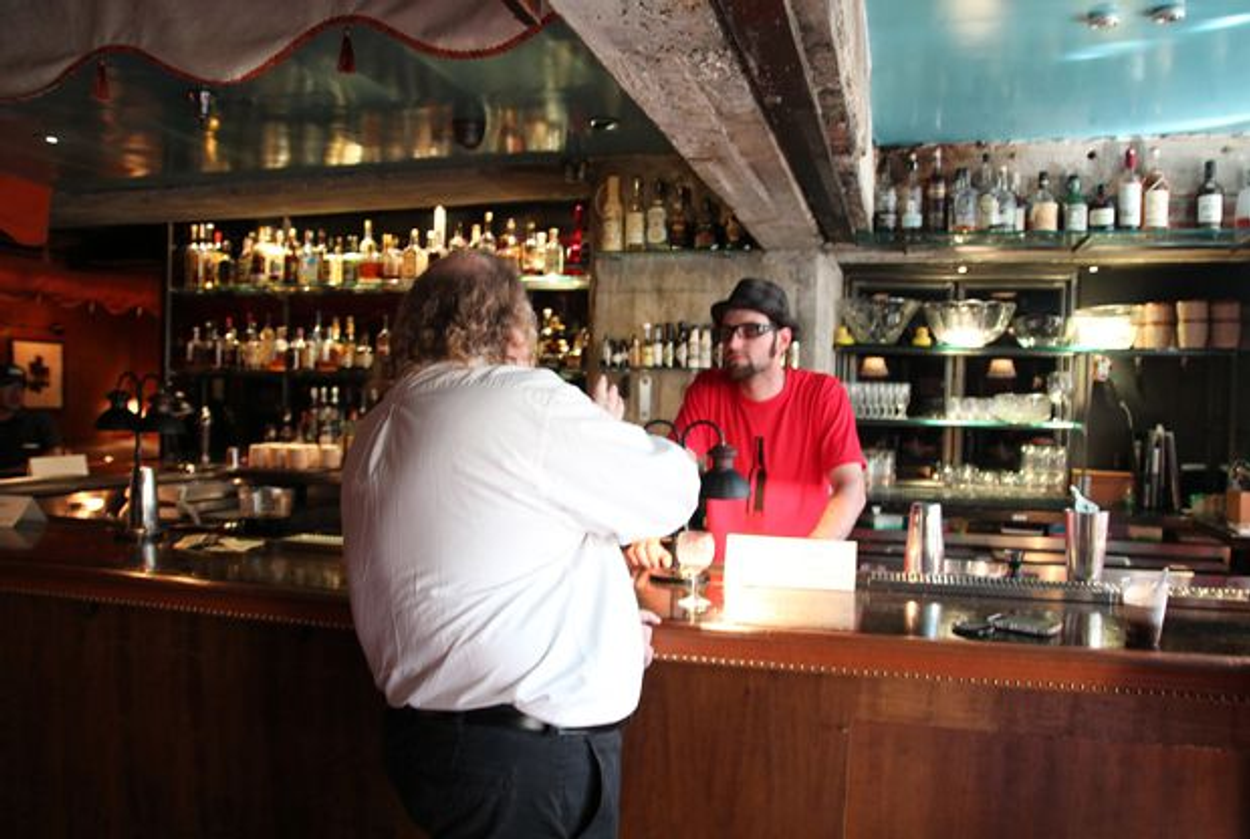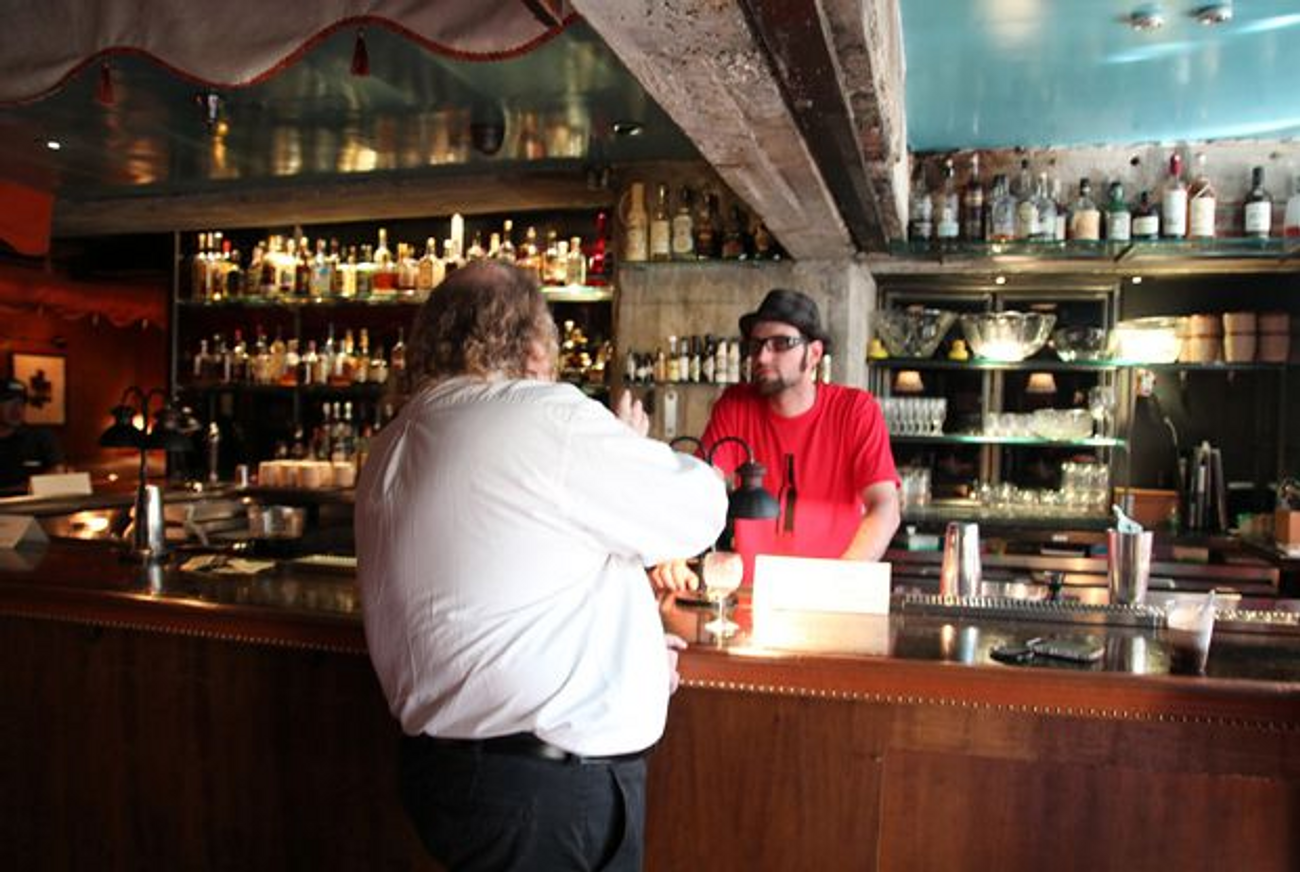L.A.’s Jewish Top Foodie
Pulitzer-winning food critic Jonathan Gold on his family, his favorite delis, and what makes food Jewish




Pulitzer Prize-winning food critic Jonathan Gold shows up every year at L.A. Weekly’s annual Gold Standard fundraiser. After all, the food-and-wine benefit was named for him, and its proceeds benefit Heal the Bay, an environmental nonprofit where his brother Mark was, until recently, president. But this year, as Gold stood at the entrance of the fundraiser, dressed in striped gray trousers and a pink plaid shirt, something was different.
The March event—held at the Petersen Automotive Museum on Los Angeles’ Miracle Mile, featuring food and drink from some 50 of Gold’s “essential” restaurants—was also a farewell for Gold. He was leaving L.A. Weekly, where he started writing 30 years ago, and moving the next day to the Los Angeles Times to become the daily’s restaurant reviewer. So, for many of the chefs and owners of L.A.’s thousands of ethnic restaurants that he brought to the fore over the years, this was a chance to thank him.
Susan Feniger, one of the chefs at the event, who made a refreshing mint lemonade alongside Chinese moon cakes, said of Gold, “To have a local restaurant critic who is drawn to dumpy or street food places—that is, in reality, what food is about.”
Gold has been to thousands of off-the-beaten-track restaurants in L.A., often holes in the wall with amazing ethnic dishes. Most restaurant critics don’t bother with such places, opting instead to focus on mainstream venues; Gold, in contrast, has redefined the mainstream.
“There is nobody like Jonathan. He is brilliant,” said food writer Ruth Reichl, currently editorial adviser at Gilt Taste. “He is a person who lives in his head in some way. I don’t claim to know his interior life, but it is very rich.”
Part of that richness comes from Gold’s Jewish upbringing, which has affected his interest in food and writing. Although Gold has interviewed thousands of people over the years, he finds himself on the other end of interviews far less often. And in those instances, Gold doesn’t usually discuss his Jewishness. So, I caught up with him recently, after he started back at the Times, to talk about his childhood, his career, and how being Jewish has influenced him.
The first and only food writer to win the Pulitzer—in 2007—Gold traces his interest in food to his childhood. Born and raised in L.A., he is the son of a Jewish probation officer and a Christian Scientist teacher and librarian who converted to Judaism when they married.
“I grew up in the most Reform family possible,” Gold told me. “My dad’s idea of being Jewish was dropping us off at religious school and reading the newspaper. My father always felt more Jewish in the delis than he did in the shul. Sundays were deli day at Junior’s or Canter’s.”
Perhaps that childhood deli day lay some of the foundation for a lifetime of food writing, day in and day out as if a religion itself.
“Deli food in L.A. is great,” he noted. According to Gold, there is a hierarchy of delis in L.A. with Nate and Al’s at the top, Lenny’s, a show-bizzy place, and Junior’s for the middle class. Brent’s, says Gold, is “filled with arrivistes from the valley.”
“My favorite is still Langer’s, because it is unreconstructed deli,” he added. “All the deli owners in this country are third generation, who have decided that what people really want is chicken salad and club sandwiches.” Like many L.A. foodies, Gold prefers Langer’s pastrami with its crispy bread, and the restaurant’s tangy Reuben sandwich: “Langer’s doesn’t make any claims to be anything but a deli.”
As a young boy, Gold wanted to be a poet, but his other calling kept getting in the way. “Half the poems were about food,” he recalled with a laugh. “My interest in food became systematic. In my senior year of high school, I had dinner almost every night with the parents of my girlfriend, the daughter of Chinese college professors. They made four courses of simple, home-cooked food every night.” Gold watched in the kitchen. “I remember the one food she was protecting me from was tofu. Being a non-Chinese person, she thought I would find it disgusting,” he said. “That was what she was protecting me from!”
As a freshman at UCLA, where he studied art and music, still a huge passion, Gold worked at Milky Way, a kosher restaurant on Pico Boulevard run by Steven Spielberg’s mother, Leah. “I was the beginner of beginner of chefs,” he said, “chopping vegetables, putting things in the oven. I also had the particularly odious job of looking carefully at each egg to see if it was fertilized or not. I didn’t last there very long.”
While he remains a hobbyist cook, Gold decided to leave the actual cooking at restaurants to the chefs. But he devoted his life to food as a writer. And as a critic, he has a special knack for finding what’s new, or unusual, or particularly good to eat.
“Jonathan has this weird radar,” said Nancy Silverton, the chef of Mozza and a longtime friend with whom his family vacations each year in Umbria. “He studies guidebooks, especially the Slow Food Guide to Italy, so by the time you show up at a restaurant and it is closed, he could just find the next best restaurant in town. His knowledge is not necessarily first-hand, but he retains so much at each dinner that is so shocking. He is an incredible foodie, he really is so passionate.”
That passion carries over into his writing. Reichl praised his hard work: “What makes him such a great writer is his curiosity and vast knowledge on a million different topics.”
“He knows he is good but never good enough,” said Reichl, who started working with Gold in the mid-1980s, bringing him to an earlier stint at the Los Angeles Times and then Gourmet magazine before his return to L.A. Weekly a decade ago. “As an editor it is frustrating because he won’t give it up.”
Folk legend is that Gold eats seven meals a day. “That is urban myth,” he said. But he admitted that when he is writing about small Chinese restaurants in one area of L.A., he might try dishes from four or five restaurants in one evening before figuring out which one to review. He also has been known to take four hours for lunch, return home, and be ready for a big dinner.
Although Gold did not grow up religious, he knows his Jewish food—and not just deli. He can expound on North African Jewish restaurants, too: “I wish we had more of them,” he said. “The Magic Carpet had killer melouach,” a delicious layered Yemenite flat bread with butter, “but it went out of business.”
He has definite feelings about hummus, too. (I already knew this because I had once turned him on to a place called Hummus Bar and Grill, and he was there within hours; it’s now one of his favorites.) “I sort of like the orthodoxy of hummus fetishes,” he said. “I mean people who are insane about hummus.”
But hummus and deli notwithstanding, he’s unsure exactly what makes certain foods Jewish. “What would be a Jewish dish?” he mused. “I am not a Jew in the kitchen. Is it fried artichokes in the Roman way, a pasta with ricotta and lemon, or fried chicken in olive oil? All are technically Jewish, but are they?”
Even though Gold gave up on any notion of becoming a restaurant chef many years ago, he still cooks at least five times a week at home. “Before I go out to restaurants, I cook for my family from the farmers markets,” he said. “One of my criteria is that the dinner at the restaurant be as good as the dinner left behind. I really resent it when it isn’t. Going out and eating something substandard infuriates me because I can get good ingredients at home.”
When asked what he made his wife, Laurie Ochoa, former editor of L.A. Weekly, and his children—Isabel, 17, and Leon, 9—for breakfast the day I spoke with him, he answered in a fashion that seemed to sum up everything about a Jewish foodie in Southern California: “Chilaquiles, basically eggs with leftover corn tortilla chips stirred with a little salsa and finished off with Mexican sour cream and a sprinkling of chopped herbs. We call it Mexican matzo brei.”
Emerald Palmer Mint Lemonade, adapted from Susan Feniger
3 medium cucumbers (1 1/2 pounds)
2 cups fresh mint, plus mint for garnish
1 1/2 cups lemon juice, from about 6 to 8 lemons, plus lemon for garnish
1/2 cup agave syrup
3 teaspoons matcha powder (Japanese green tea powder)
1/2 teaspoon salt
1. Cut the unpeeled cucumbers into large chunks and put them, along with the mint, lemon juice, agave syrup, matcha powder, salt, and about 1 cup of water, in a blender. Puree until liquefied.
2. Strain through a sieve to remove any large pieces. Pour into a large pitcher and add 4 more cups of water. Stir and chill until ready to serve. Garnish with fresh mint and/or lemon slices and lots of ice.
Yield: about 2 quarts
Joan Nathan is Tablet Magazine’s food columnist and the author of 10 cookbooks including King Solomon’s Table: a Culinary Exploration of Jewish Cooking from Around the World.